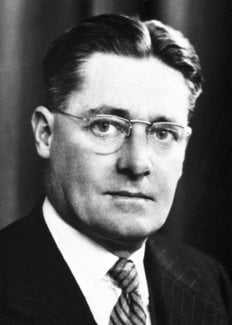Sir Howard Florey
Biographical

Sir Howard Walter Florey was born on September 24, 1898, at Adelaide, South Australia, the son of Joseph and Bertha Mary Florey. His early education was at St. Peter’s Collegiate School, Adelaide, following which he went on to Adelaide University where he graduated M.B., B.S. in 1921. He was awarded a Rhodes Scholarship to Magdalen College, Oxford, leading to the degrees of B.Sc. and M.A. (1924). He then went to Cambridge as a John Lucas Walker Student. In 1925 he visited the United States on a Rockefeller Travelling Fellowship for a year, returning in 1926 to a Fellowship at Gonville and Caius College, Cambridge, receiving here his Ph.D. in 1927. He also held at this time the Freedom Research Fellowship at the London Hospital. In 1927 he was appointed Huddersfield Lecturer in Special Pathology at Cambridge. In 1931 he succeeded to the Joseph Hunter Chair of Pathology at the University of Sheffield.
Leaving Sheffield in 1935 he became Professor of Pathology and a Fellow of Lincoln College, Oxford. He was made an Honorary Fellow of Gonville and Caius College, Cambridge in 1946 and an Honorary Fellow of Magdalen College, Oxford in 1952. In 1962 he was made Provost of The Queen’s College, Oxford.
During World War II he was appointed Honorary Consultant in Pathology to the Army and in 1944 he became Nuffield Visiting Professor to Australia and New Zealand.
His best-known work dates from his collaboration with Chain, which began in 1938 when they conducted a systematic investigation of the properties of naturally occurring antibacterial substances. Lysozyme, an antibacterial substance found in saliva and human tears, was their original interest, but their interest moved to substances now known as antibiotics. The work on penicillin was a result of this interest.
Penicillin had been discovered by Fleming in 1928 as a result of observations on a mould which developed on some germ culture plates but the active substance was not isolated. In 1939, Florey and Chain headed a team of British scientists, financed by a grant from the Rockefeller Foundation, whose efforts led to the successful small-scale manufacture of the drug from the liquid broth in which it grows. In 1940 a report was issued describing how penicillin had been found to be a chemotherapeutic agent capable of killing sensitive germs in the living body. Thereafter great efforts were made, with government assistance, to enable sufficient quantities of the drug to be made for use in World War II to treat war wounds.
Florey was a contributor to, and Editor of, Antibiotics (1949). He was also part-author of a book of lectures on general pathology and has had many papers published on physiology and pathology.
Dr. Florey has had many honours bestowed upon him. Among these may be mentioned the Lister Medal of the Royal College of Surgeons, the Berzelius Medal of the Swedish Medical Society, the Royal and Copley Medals of the Royal Society, the Medal of Merit of the U. S. Army, and many others.
He is President of the Royal Society since 1960 and a Fellow of the Royal College of Physicians, and among other honorary fellowships he holds is that of the Royal Australian College of Physicians.
He has been awarded honorary degrees by seventeen universities and is a member or honorary member of many learned societies and academies in the field of medicine and biology.
In 1944 he was created a Knight Bachelor.
He married Mary Ethel Hayter Reed in 1926. They have two children, Paquita Mary Joanna and Charles du Vé.
This autobiography/biography was written at the time of the award and first published in the book series Les Prix Nobel. It was later edited and republished in Nobel Lectures. To cite this document, always state the source as shown above.
Sir Howard Florey died on February 21, 1968.
Nobel Prizes and laureates
Six prizes were awarded for achievements that have conferred the greatest benefit to humankind. The 14 laureates' work and discoveries range from quantum tunnelling to promoting democratic rights.
See them all presented here.
